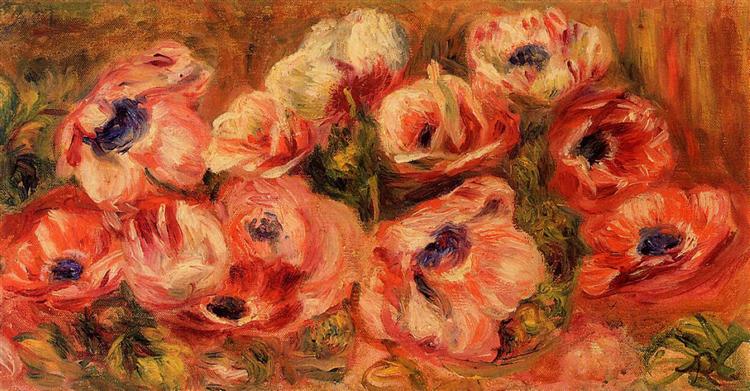Beskrivelse
Pierre-Auguste Renoir's Anemones, created in 1880, is a magnificent example of the artist's signature Impressionist style, displaying his mastery in the representation of light and colour. At first glance, what catches the viewer's attention is the exuberance of vitality radiated by these flowers, whose symbolism is often associated with the fragility and ephemeral beauty of life. Renoir, known for his ability to capture the splendor of the everyday and the immediate, achieves in this work a synthesis between nature and visual poetry.
The composition of “Anemones” focuses on a vibrant and lush bouquet of these flowers, presented in a delicate vase. The vibrant use of colour accentuates the feeling of freshness and luminosity, with shades ranging from white, pink and deep red of the anemones, while the clearly rendered background further highlights the floral splendour. This contrast between the vivid hues of the flowers and the subtle soft tones of the background demonstrates Renoir’s skill in using the technique of chiaroscuro and the fusion of colours, something that becomes a defining characteristic of his work.
Loose brushwork and the treatment of shapes are fundamental elements in Renoir's impressionist style. In "Anemones," we can see how the artist applies an almost tactile technique in the use of oil, creating textures that invite the viewer to come closer and observe more closely. Anemones are not just flowers; they represent an intimate connection with nature, a recurring theme in the impressionist era, where capturing natural light becomes a primary objective.
Unlike other works by Renoir that present human figures in social or intimate contexts, "Anemones" delves into the world of nature in a purer and more contemplative sense. This artistic decision can be interpreted as a reflection of the search for the essence of beauty in its simplest and most direct form. The flowers seem to come to life through the painter's energetic and determined brushstrokes, suggesting that they are the true protagonists of the scene, while the vase serves as a mere accessory that facilitates their display.
In a broader scope, Anemones aligns with the Impressionist movement's interest in capturing everyday life and the ephemeral. Renoir, as part of this collective, excelled in the depiction of light and its effect on color, exploring new approaches through innovative techniques that challenged the academic conventions of his time. It is interesting to note how, throughout his career, Renoir experimented with different styles, from the most rigorous depiction of the human figure to his looser, more expressive interpretations of nature, as in this painting.
In conclusion, “Anemones” is a work that encapsulates the essence of Impressionism through its vibrant color palette and masterful painting technique. Renoir not only presents visual appeal, but invites the viewer to reflect on the impermanence of beauty. Every stroke, every nuance of color suggests an intimate interaction between the artist and the natural world, making this painting a lasting testament to artistic expression in the context of the 19th century.
KUADROS ©, a famous painting on your wall.
Hand-made oil painting reproductions, with the quality of professional artists and the distinctive seal of KUADROS ©.
Painting reproduction service with satisfaction guarantee. If you are not completely satisfied with the replica of your painting, we will refund 100% of your money.

